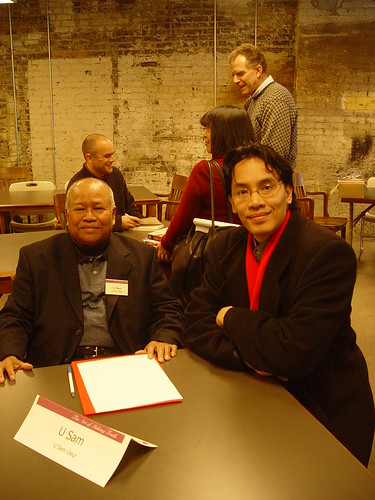
Thinking about the recent release of the late monk Ly Van's book, O! Maha Mount Dangrek, leads me to think about U Sam Oeur, one of the few survivors of the Killing Fields under Pol Pot's regime.
I'd met him briefly a few years ago at the Loft Literary Center and he was a quiet but colorful man who writes with deep honesty. The main book he's known for is his bilingual Sacred Vows, which has established its place among Cambodian arts and letters, printed by Minnesota's own award-winning Coffee House Press.

Coffee House Press also printed his memoir, Crossing Three Wildernesses.
During the time of the Khmer Rouge, Pol Pot was trying to systematically murder and eliminate anyone considered an intellectual or part of the previous regime.
U Sam Oeur, along with his family, survived this terrible period by faking illiteracy and hiding his intelligence while serving in the forced-labor camps for four years. He had to destroy the manuscripts of his literary work or he would have been tortured and shot. Even after all of this, he still risked death at any moment due to the randomness of violence under the Khmer Rouge.
Eventually, he escaped and now lives in Texas, where he continues to write poetry and is also translating the poems of Walt Whitman into Khmer. He holds an M.F.A. in Poetry from the Iowa Writers Workshop.
With his poems, it's often difficult to separate the history and significance from the aesthetic quality and meaning. The poems of Sacred Vows are largely unflinching and honest to a fault.
U Sam Oeur's poems rarely descend into political polemic or indictment, or banal romanticization of the past. They reflect his perspective and what he remembers and treasures of his society with careful consideration and a sense of tradition.
U Sam's tale reminds me of the power of literature and the journeys many of us struggle through. To go through so much and still believe in art and the insistence that the human voice must express. Something we should all remember as we create our own work, remembering the tragic ease by which almost an entire society's voice might be lost in an anonymous, bloody field.
No comments:
Post a Comment